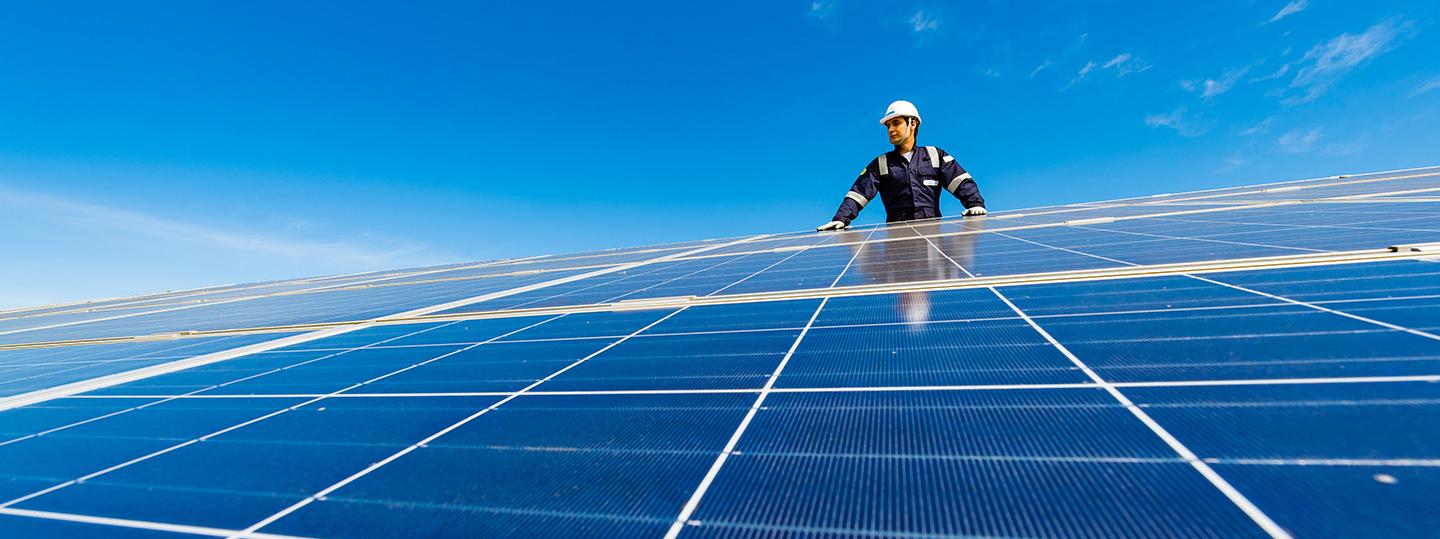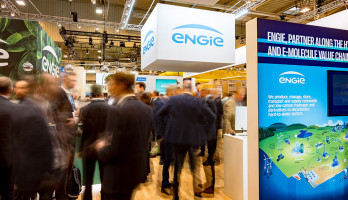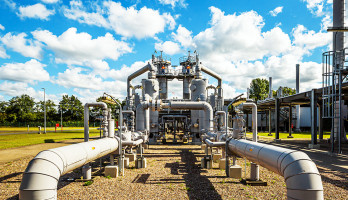
Renewable energies on the rise – Photovoltaics in logistics offers great potential
The expansion of photovoltaics is gaining momentum in Germany. In 2019 alone, solar installations contributed 46.5 terawatt hours, or more than eight percent, of domestic electricity generation, according to the Fraunhofer Institute. In order to cover the entire energy demand via renewable energies in the future, however, a further massive increase in the installed PV power is necessary. What is needed here is primarily the area of building management, in which approximately 35 percent of the final energy consumption is generated. On the way to sustainable operation and climate-neutral supply chains, the use of photovoltaics in logistics in particular promises enormous future opportunities. With optimal infrastructure conditions and the increasing importance of e-mobility, this sector combines several factors that make the generation and use of solar power attractive.
Architecture of logistics properties creates ideal conditions for PV installations
"Logistics properties such as warehouses or distribution centers are predestined locations for the further expansion of photovoltaics," explains Stefan Schwan, Head of Facility Solutions at ENGIE Deutschland. Large roof areas of often several thousand square meters allow the installation of powerful solar installations, which not only provide cost-effective green electricity, but also contribute considerably to climate protection, i.e. the reduction of CO2 emissions. "A typical solar plant on a logistics center has an output of 750 kilowatts and generates 750,000 kilowatt hours of electricity per year," says Daniel Fürstenwerth, Managing Director of the Berlin-based ENGIE subsidiary Solarimo. "This eliminates nearly 500 tons of CO2. By way of comparison, this corresponds to an amount of CO2 that is absorbed by 35,000 beech trees every year," says Fürstenwerth.
Innovative solar technology for the logistics industry of the future
With the installation of conventional solar installations on roofs, the possibilities of using photovoltaics in logistics are not yet exhausted. For example, the Dresden-based company Heliatek develops and produces lightweight, flexible and organic solar films. Your advantage: They are particularly suitable for roof surfaces and the facade design of buildings which, for structural reasons, cannot be equipped with commercially available PV systems.
Decentralized and self-sufficient supply of low-cost, climate-neutral electricity
In addition to the favorable framework conditions for the generation of solar power, the possibilities of decentralized and self-sufficient supply in particular open up new margins for logistics companies. To this end, ENGIE plans and develops tailor-made concepts that ensure the efficient use of the self-generated electricity. "The power generated from photovoltaics is already quite economical compared to coal, gas or CHP generation," Schwan points out. "In addition, no grid fees are due for internally consumed electricity, and the amount of the EEG surcharge to be paid is also limited to 40 percent," says Schwan. Particularly in the longer term, photovoltaics in logistics thus enables an attractive scenario for a future-oriented zero-carbon strategy and combines sustainability with measurable economic advantages.
Connecting photovoltaics to e-mobility
However, the benefits of more sustainable building management are not limited to self-generated solar energy. Photovoltaics can play a key role in logistics, particularly in the field of electromobility, i.e. for the establishment of climate-neutral supply chains. In this context, a direct feed of self-generated PV power into the existing charging infrastructure takes place, which is an ideal alternative to the use of the public power grid. Whether DPD, Hermes or GLS – in the face of tighter environmental requirements, logistics service providers are increasingly focusing on the development and expansion of electrically powered vehicle fleets. And online retail giant Amazon is also planning to buy 100,000 e-delivery trucks on its way to its goal of becoming carbon neutral by 2040. The "Vehicle to Grid" concept, in which electric vehicles can act as mobile power storage units to provide energy when needed, will allow the interaction of photovoltaics and e-mobility in the logistics sector to be taken even further in the future. The transport fleet is charged via the in-house solar installation and is at the same time available as a flexible storage reserve in case of peak loads or no sunshine.
More flexibility thanks to modern battery storage technology
Speaking of sunshine: The use of modern battery storage systems can make the fluctuating power generation of the solar installation usable for the continuous power supply. Especially in the logistics sector, where night work is part of the usual day-to-day business, it is important to have an intelligent overall concept that, in combination with powerful solar and storage technology, meets the requirements on site at all times. "The more tasks a battery storage takes on, the more economical the operation is," says Christoph Maurer, Key Account Manager at ENGIE Impact. "In addition to the expansion of the use of own power, electric mobility comes into play as an additional application at a logistics site. For green e-mobility, battery storage is also an important enabler, as it can provide additional energy for the short-term charging of larger vehicle fleets that go beyond the capacity of the power supply," emphasizes Maurer.
Attractive contracting models for photovoltaic utilization in logistics
In addition to the acquisition of PV systems, contracting offers an attractive alternative for entry into photovoltaics, for example for rented logistics properties or for saving investment costs. As part of a contracting partnership with ENGIE, you benefit from climate-neutral and cost-effective power generation and efficient integration into technical facility management without having to invest yourself. As your contractor, we take over all tasks v from the planning and financing of the plant, to the construction and operation, to the professional maintenance – and supply you with the required energy at plannable costs.
Our Expert










